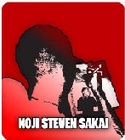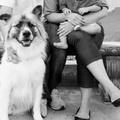The best thing about being Japanese American is the travel benefits. When I leave North America and travel anywhere in the world, I can choose to be either Japanese or American depending on the political situation in that country at the time.
For example, if I’m pretty much anywhere in Asia I’m choosing to be American. Might even consider wearing an American bandana, if I had one. But if I were ever to go to the Middle East, I’m Japanese for sure.
The biggest problem with the above examples is that it assumes that I even have a choice. Unfortunately, the moment I step out of this country, I am Japanese. Even when I speak English perfectly and I tell them that I’m an American, they still think I’m from Japan.
This is made most clear when I go to any tourist spot and every vendor speaks to me in broken Japanese. This has happened to me in Australia, Mexico, Bali, Indonesia, Jamaica, most of Europe, and anywhere/everywhere I’ve ever been. I used to try to confuse them by speaking Spanish (in non-Spanish speaking countries). Once I even spoke gibberish just to mess with them. But in the end, I figured that they probably thought I was speaking Chinese.
When I spent six months in Australia, it was almost impossible for people to understand that although I looked Japanese that I was actually American. This was made especially clear by a taxi driver that I had befriended who asked me every day to speak Japanese to him instead of English. (He wanted to practice his Japanese language skills.) I always thought this was ironic since there are so many Asian looking people who speak English with an Australian accent. I used to wonder if they went through the same thing. Now I know, they do.
I don’t want to make it seem like this mistaken nationality is always a negative thing though. I admit that every time I board a plane, I worry that it’s going to be hijacked. The only thing that reassures me is the thought that I probably wouldn’t be killed because they (the terrorists) would automatically think that I (the handsome Japanese looking man) was a Japanese citizen rather than an American citizen. And who am I to correct them?
I used to believe that I would have to speak Japanese or English with a stereotypical Asian accent to the terrorists to convince them of my Japanese-ness. But now I know better. They would never question me. One look at me would be enough to prove my nationality: Japanese.
Ironically, the thing that bothers me most about this whole hijacking scenario is how the media would classify me if I were to die. Would they call me an American? Or say that I was Japanese? For some reason, this really worries me more than the actual dying. For the record, I would want to be listed as an American. And to all my surviving friends and family, I would expect nothing less than going to war to avenge my needless and tragic death.
It’s depressing but I expect this kind of confusion when I leave the country. However, what gets me angry most is when it happens here in the States.
On a recent trip to Hawaii, I went to the Pearl Harbor National Monument. While seeing the sad sights, I felt the stares of all the other “Americans.” They were saying without words that the attack on Pearl Harbor was my fault. That somehow I had orchestrated it, carried it out and then had the nerve to show up to gloat in their ugly fat faces.
I wish that I could have told them that I was just as American as they were and how Pearl Harbor was equally upsetting to me as it was to them. And if I had the chance, I would even try to explain how Pearl Harbor was probably the worst thing that could have happened to someone that looked like myself. My dad’s family was incarcerated for the duration of the war; their only crime was looking like the enemy.
But sadly, I know that if I had said something/anything they wouldn’t hear it. They would probably just nod their heads and think: “This Japanese guy can speak English pretty good.”
I dislike being considered Japanese so much when I travel within the US that when I see Japanese tourists I head the other way. I intentionally don’t take pictures in public and make sure to stay as far as possible from any tourist destinations or major landmarks as possible. I also speak English all the time and louder than normal so that there can be no confusion about who/what I am: American.
This is okay if I’m by myself or if I’m with my friends. But this denial becomes rather difficult when I’m with my mom, who is really from Japan.
I should be used to this all by now. And I am. Most people of color who travel are used to it too. I guess what bothers me is that this means that there is no place where I belong. No place where I am naturally supposed to exist.
When I was kid, I thought that place would/could be Japan. But in Japan, I am clearly not a “real” Japanese.
Nowadays, I fantasize about a place where a person like me can go and fit in. Too bad such a place does not exist. In the mean time, I’ll just go back and forth, depending on where I am.
How do you feel when you travel?
© 2007 Koji Steven Sakai






